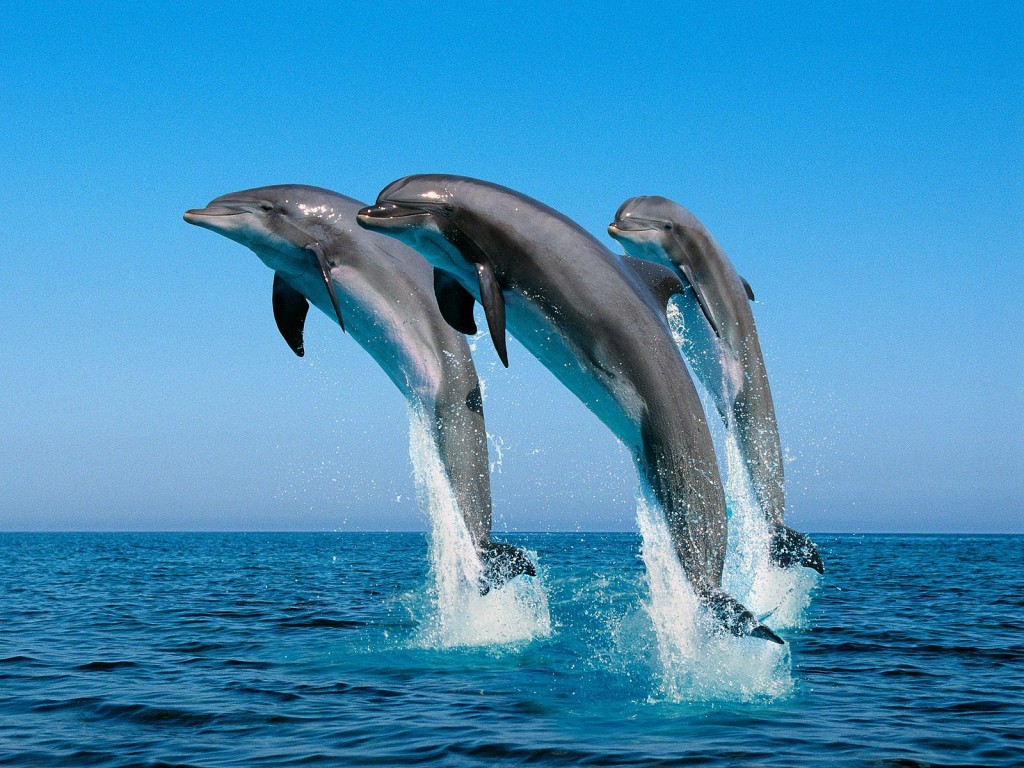…for no other reason than I found two dolphin stories on the Internet today.
Happy Dolphin Story:
Courtesy of New York Mag:
Adorable Old Dog Rescued by Dolphins. We Repeat: Dog. Rescued. By. Dolphins.
Remember that time a bear rode a horse in China and it filled us with terror? Well, today we bring you a story of animal collaboration that will fill you with joy — which might be much-needed in a week when it seems like a large section of the Eastern hemisphere is going straight to hell. Earlier this week, an eleven-year-old Doberman named Turbo escaped from his yard and plunged into a canal in Marco Island in Florida. Since the vertical walls of the canal are high, Turbo couldn’t get out, and was forced to tread water against the current for over half a day. Nobody noticed him until, fifteen hours into his ordeal, a lady living nearby heard strange splashing. It wasn’t Turbo, who by that time was exhausted. It was a pod of dolphins who had found him and were staying with him, splashing loudly until they received human attention. The neighbor jumped into the canal and fished him out. When owner Cindy Burnett was joyfully reunited with her pooped pet, she fretted that he had been alone and scared for so long. “No,” the unnamed rescuer told her. “The dolphins were with him.”
Sad Dolphin Story:
Courtesy of CNN:
Deaths of baby dolphins worry scientists
(CNN) — Baby bottlenose dolphins are washing up dead in record numbers on the shores of Alabama and Mississippi, alarming scientists and a federal agency charged with monitoring the health of the Gulf of Mexico.
Moby Solangi, the executive director of the Institute for Marine Mammal Studies (IMMS) in Gulfport, Mississippi, said Thursday he’s never seen such high death numbers.
“I’ve worked with marine mammals for 30 years, and this is the first time we’ve seen such a high number of calves,” he said. “It’s alarming.”
At least 24 baby dolphins have washed up on the shores of the two states since the beginning of the year — more than ten times the normal rate. Also, six older dolphins died.
In January 2009 and 2010, no calf strandings were reported, compared to four in January 2011, the institute said. During the month of February for those years, only one calf stranding was reported each year.
Blair Mase, lead marine mammal stranding coordinator for the National Oceanic and Atmospheric Administration (NOAA), echoed Solangi’s concern.
“It’s not common for this time of year to recover such young animals. When you put the numbers together, it’s quite high compared to previous years.”
The occurrence has prompted NOAA to designate these deaths as an “unusual mortality event” — defined as a stranding incident that is unexpected or involves a significant loss of any marine mammal population.
While bottlenose dolphins are actually the most-frequently found stranding animal, the season usually begins in March, according to Mase.
“We receive reports of stranding year round. We get an average of 700 total every year in the Southeast,” she said.
While scientists have seen baby dolphins wash up in the past, “This is not during the months that they should be,” said Solangi. “We keep getting reports of new ones all the time, and February isn’t over yet.”
There have been 13 unusual mortality events involving dolphin deaths in the Gulf of Mexico since 1991, Mase explained.
Marine mammals are particularly susceptible to harmful algal blooms, infectious diseases, temperature and environmental changes, and human impact, she said.
“Unfortunately we don’t have a smoking gun here. We’re looking at the possibility of an algal bloom but we don’t see any evidence of a bloom going on in the water. Temperatures are a bit cooler, so we’re looking into water temperature data and seeing if that has a role, but it’s a little bit too early to tell.”
The IMMS said it has been able to perform full necropsies on a third of the 24 calves. The majority of the calves were too decomposed for a full examination, but the institute has taken tissue samples for analysis.
The institute does not have conclusive results on the causes of death.
(continue reading this story here…)
Dolphins are pretty cool. Them dying isn’t. Let’s just blame BP.
If that story was too sad for you, I apologize with THIS:
Goodday.



